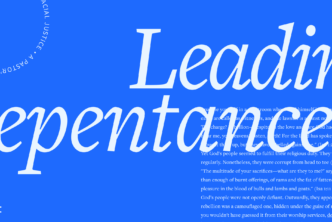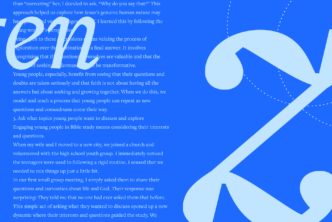A couple years ago, we asked some of our team members who attended seminary to share some of their experiences—what is the one piece of advice each one would want to leave for current seminarians. I hope the reflections are helpful to you. Many of them mention our book on this topic, Surviving and Thriving in Seminary.
I’ve added mine to the mix as well.
Treat your seminary studies like a job
I wish I’d had a book like Surviving and Thriving in Seminary to stress the importance of research skills and time management. In chapter 4, “Taking Responsibility,” Danny Zacharias and Ben Forrest write:
Graduate level study is more demanding than undergraduate level study. Add to this the different life circumstances seminary students are in, and the end-of-semester stress may be a recipe for disaster, both mentally and emotionally. I (Danny) recall several semesters during my graduate studies when I was completely done with my coursework (minus exams) while my peers were just starting their major assignments. It was a great feeling. But it was not an accident or luck: I treated my studies like a job.
In this book, Zacharias and Forrest teach you the skills you need to succeed academically. But not only do they give guidance on how to manage your time so you can succeed academically; they recognize the need to manage your time and energy so you also stay committed to your devotional life.
That is what I love about this book; it is both an academic and spiritual handbook. It treats seminary students as integrated wholes. When you’re in seminary, you can’t just use your brain and leave your heart unchanged.
— Elliot Ritzema
Care for your family
In high school and my undergraduate studies, most assignments came pretty easily for me. I always loved reading and writing, so cranking out papers came naturally. This meant I could wait until fairly late in the game to get going on a writing assignment, knowing that my writing and organizational skills would carry me through.
But when I was in seminary, it was a different story. I was studying the Bible! I was studying theology! I loved it, but I also found that it was harder. What I was studying mattered for me personally, so I would often get hung up reading a book when I only needed to spend a little time with it for my assignment. And if I didn’t take the time to go to the library to seek out the right sources, including journal articles, relying on my own writing ability wasn’t going to cut it. In short, my writing skills were still sharp, but I needed to improve my research skills. I couldn’t afford to waste time on just any kind of study; if I didn’t cite the right kind and amount of sources, my grade would suffer. With increased demands on my time, I needed to make sure I was looking at the right sources, and only pay attention to the information in those sources that was relevant to my topic.
I wish I’d had a book like Surviving and Thriving in Seminary, but chapter 3, “Preparing Your Family,” and especially Appendix 3, “A Word to Spouses,” really hit home for me. I found myself saying over and over, “Ah, that was us! I wish I would’ve known that then.” Having this book in my back pocket would’ve helped me with a lot more than my study skills. Here’s hoping it helps a lot of my future fellow seminarians—and their spouses—along the journey!
— Brannon Ellis
Use the right tools
Seminary can be an excellent experience if you take advantage of it. I started seminary the fall semester after I graduated with a BA in Theology, and it was a challenge. I wish there had a been a book like this that I could have read during the summer before I started school. The strength of Surviving and Thriving in Seminary is that it provides an excellent game plan on how to prepare for your first semester. While reading, I kept finding things that would have saved me a lot of wasted time.
While I found some great advice throughout the book, chapter 10 covers the topic of using the right tools. This really resonated with me and I wish I would have started thinking about this before I started seminary. I would have avoided wasting a lot of time.
First, you have to take a lot of notes in class. I lost a lot of time trying to figure out what type of note-taking software I should use, and I tried multiple programs. Unfortunately, it made it impossible to keep all of my notes in one location, and it took a lot of time to learn how to use them. I even ended up losing some of my notes. Surviving and Thriving in Seminary provides some great suggestions on ways to organize your notes. I especially loved this advice, “Whatever you choose, become a guru for that software.” (159-160) I wish now I had taken the time before I started my first semester to pick the software I wanted to use and learned how to use it well.
The second thing is Bible software. I thought at first this would be something nice to own, but not something I needed. I quickly learned this wasn’t the case. My first semester I took an exegesis class on the book of Revelation that required me to write a paper on a particular word. I needed to use BDAG and some other resources. This paper was worth 60% of my final grade. Unfortunately, our library only had one copy of BDAG, and our class was large. Every time I went to the library someone else was using that one copy of BDAG. I ended up purchasing Logos Bible Software just in time. It allowed me to do the research quickly and I got an A- on the paper. Take this book’s advice and consider this a tool you need to have.
Take the time to read this book and apply the suggestions the authors make. It will make your seminary experience easier. It will help you avoid mistakes others have made.
— Philana Crouch
Don’t neglect the local church
When it came time to choose a seminary, I felt my ignorance pretty keenly. How was I supposed to know what seminaries were good? I felt like I’d have to go through seminary before I had enough training and wisdom to pick one. So I prayed and talked to wise counselors, and I ultimately based my decision on something I’m afraid I wouldn’t have thought of if a respected friend (who was making the same decision) hadn’t mentioned it: church.
A big reason I went where I did was that I knew there was a church I could serve in and learn from, and a particular pastor who took seriously his role in mentoring the young men who were studying at the nearby school. Looking back, that church ended up being a good half of my education. That church enabled me to connect what I was learning in class to real ministry and real life. It provided counsel and accountability (and, truth be known, rebuke) through elders and fellow church members. Most especially, it drilled good Bible exposition into me, modeling for me what I was being taught in the classroom.
My advice: make sure you have a good church to attend that will complement your seminary studies.
— Mark Ward
Take the Sabbath
I just about burned out in seminary, and it wasn’t until after seminary that I saw probably the biggest reason why: I rarely honored the Sabbath. Well-meaning Christians disagree on whether keeping the Sabbath is a mandate anymore, but that’s not what I’m discussing here. What I mean is simply this: acknowledge your human limitations and embrace the pattern of rest that God has given to you. It’s a gift for you, and you need it.
I was obsessed with productivity. I idolized A’s. I mingled my identity with my GPA. And what suffered is far more important than any of those, then and now: my character, health, and formation. The last of those is the true goal of education; don’t sacrifice it for an empty A.
— Matthew Boffey
***
A version of this post compiled by Jake Mailhot originally appeared in August 2017.






